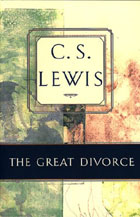| > cMusicWeb.com > Prose > C. S. Lewis |
|


[ The Great Divorce | 1946 ]
|
|
|||
|
|
|
|
|
|
THEMUSIC
|
|||
|
|
|||
|
|
|||
|
CURRENTS
|
|||
|
|
|||
|
|
|||
|
SEARCH
|
|||
|
|||
|
|
|||
|
cMUSICMAIL
|
|||
|
|||
|
|
|||
 C.S. Lewis had remarkable skill in writing fictional stories that illustrated a part of the Christian walk, or, in simpler words, allegory. While many of his works show this skill (including The Chronicles of Narnia, Till We Have Faces, and The Pilgrim's Regress) none of them show this skill as much as The Great Divorce, in which he examines the post scriptum of the Christian's work on earth: the afterlife.
C.S. Lewis had remarkable skill in writing fictional stories that illustrated a part of the Christian walk, or, in simpler words, allegory. While many of his works show this skill (including The Chronicles of Narnia, Till We Have Faces, and The Pilgrim's Regress) none of them show this skill as much as The Great Divorce, in which he examines the post scriptum of the Christian's work on earth: the afterlife.In a dream, Lewis finds himself in a dark and dreary place, where the houses are grey and empty, a dismal rain never stops, and time is eternally stuck in the bleak period just before sunset. Walking through this abominable town, he happens to find a bus stop which takes inhabitants out of this gloomy place and into a much brighter, happier world. Slightly bewildered, Lewis boards the bus and begins a journey out of that city (hell) and into a brighter place (heaven).
When he arrives at his destination, Lewis discovers that hell's inhabitants do not enjoy the beauty of this new land. In heaven, these people become ghosts because they are not strong enough to endure the substantive things of this world. The grass and water cut through their feet and even the tiniest apple is to heavy for the strongest ghost to carry. Yet, the ghosts refuse any help from heaven's residents and try in vain to conquer their struggles with their own power. Time and again, Lewis sees the ghosts fail on their own, but they still will not let go of what is holding them back.
Along the way, Lewis meets George MacDonald (author of At the Back of the North Wind and others) who aids him in his journey through heaven. Passing many sad spectacles of people from hell, Lewis begins to understand, with the help of MacDonald, that these people must throw away everything and commit themselves to completely follow Christ.
This little gem of a book requires deep thought, however, to fully comprehend all that Lewis intends to teach us. As usual, he pays close attention to detail and there are many hidden bits of knowledge that can only be picked up after the second or third reading. Lewis also paints excellent pictures in the reader's mind of what a person is like when he believes false things. All in all, anyone wishing to learn more about the relationship between Christianity and humanity should read this book. They will not regret it, and they may be challenged by Lewis's thought- provoking words.
Articles written by the staff.
Maintained by WebMaster Dan Ficker.
Site Design by da Man
All Material © 1999-2005 Different Media LLC
Support cMusicWeb.com